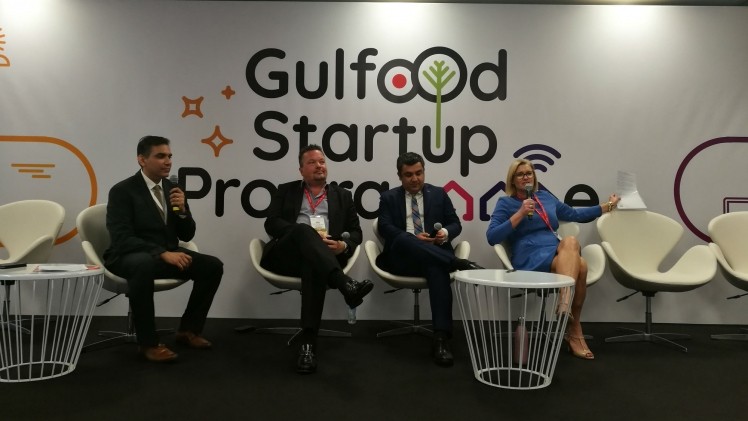Gulfood 2019
Top tips for food and beverage start-ups when collaborating with industry’s big beasts

The panel comprised of Emma Banks (Vice President, F&B Strategy & Development Europe, Middle East and Africa, Hilton), Duncan Fraser-Smith (Vice President, TFG Food and Beverage), and
Vishal Pandey (Managing Director, Data-On-A-Plate and Glasgow Consulting Group).
The session was moderated by Avinash Ratta, Managing Director, Grain Velocity and was the final panel session of the Gulfood Startup Activation Programme, part of the Gulfood 2019 show in Dubai.
From top tips in making a pitch work to healthy food trends in the Middle East region, here are some of the key insights from this discussion.
Making a successful pitch: Expert insight and top tips
Banks did not mince her words when offering her insight into how a a start-up should approach a pitch with her: “If you get your foot in the door and get and appointment to make your pitch, don’t waste it. Make sure you do your research and know a bit about the organisation you’re pitching to and the person whom you’re meeting too.
“Also remember that we’re all really busy people and tend to have the attention span of a gnat, so be interesting. Open with something interesting, like a sample or pictures or something that will capture the imagination – be visual, it’s a visual world,” she advised.
“Know your facts, know your numbers, and most importantly, make sure to understand and sell the benefits of your product to the company, how it will give the company a competitive advantage.
“When you’re dealing with big companies, you also have to be prepared to do the paperwork and the legwork, and remember to be honest with your terms and conditions. Also always, always do the courtesy of following up after the meeting.”
Fraser Smith concurred, adding that he always expects follow-up to be done within the first 48 hours after the pitch.
“If I don’t receive an email within 48 hours telling me about how your product is going to be applied to the business in a more detailed way, and how it integrates with mine, I’m sorry but I think I’m likely to forget,” he said.
His main focus points when it comes to making a pitch work for him were market relevance, passion and authenticity.
“To me, if you truly believe in your product, you put your heart and soul out on the line, and your product is relevant, authentic and unique, you’re 60% there,” said Fraser-Smith.
“Don’t get downheartened if a big company doesn’t understand what you’re doing, don’t falter. Eventually you will meet someone who has the same beliefs as you do who will support you.”
‘But most of all don’t be afraid to knock on the door and don’t let the enormity of the organisation stop you. It is in all our best interests that the food industry grows and develops efficiently and effectively.”
Ratta added that flexibility was important here too, so as to adapt to the systems of a larger organisation, connect with it and start adding value in a beneficial way.
Value for money
With all that said, the panel also agreed that value for money was one of the top concepts that start-ups need to take note of in their products/offerings.
“Value for money is crucial,” said Fraser-Smith.
“We’re all spoilt for choice as consumers and operators and as such everyone will be looking for something comfortable to the pocket that provides authenticity and consistency.
“Look at the market and see if people will pay [the price you’re asking for] and if not, be sure to [have the flexibility] to adjust accordingly.”
Large vs small: Comfortably holding hands
Banks was a strong advocate that start-ups and large companies are able to collaborate and ‘hold hands’ in a manner that makes successful business sense.
“Big organisations are always looking for fresh new ideas and innovations. [We] can innovate, but not at the pace of start-ups, and not in such a specialised manner,” she said.
“Start-ups usually are able to meet niche areas and respond to current trends, or better yet are able to create and start new trends. Large organisations are generally able to talent, niches and trends and as such will be willing to work with such start-ups.”
Pandey added that the power of networking was important in making the right connections to build successful partnerships, and suggested that all start-up entrepreneurs be sure to be present at forums such as the Global Restaurant Investment Forum (GRIF) and the Global Restaurant Investment Forum (GRIF) to seek out advice and get responses.
Health and wellness trends
According to Banks, health and wellness, especially in snacking is not a trend in the F&B industry – instead, it is here to stay.
“It’s not just about health anymore, it’s also about sustainability [and] it’s here to stay,” she said.
Responding to queries about healthy food products being more expensive, some larger corporations being unwilling to pay the premium for these, and start-ups with such suggestions ending up being compared to conventional products in terms of price, she said that persistence was the key.
“This is where you must keep going back and banging on the door,” said Banks.
“Eventually, trends and demands will push [things like these]. Look at organic – it cost a fortune previously in this region, but now we have a lot of options. Demand and volume will eventually bring the price down.
“The consumers are choosing, they know what good is and will pay accordingly. We must meet their needs, [so] it comes back to understanding your market and making sure to value-engineer your product accordingly.”



















